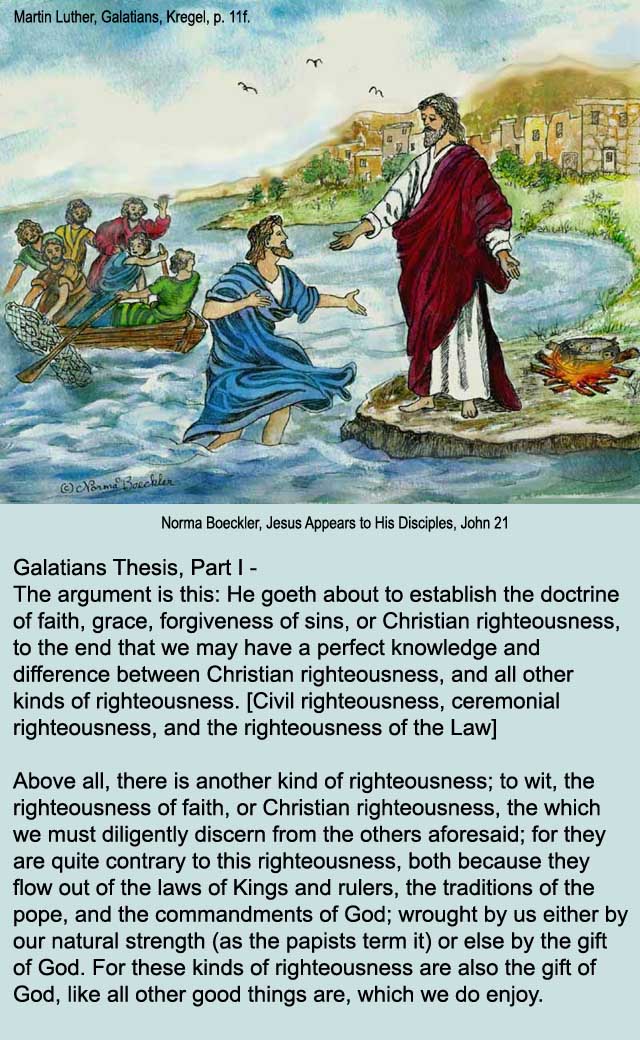
ICHABOD, THE GLORY HAS DEPARTED - explores the Age of Apostasy, predicted in 2 Thessalonians 2:3, to attack Objective Faithless Justification, Church Growth Clowns, and their ringmasters. The antidote to these poisons is trusting the efficacious Word in the Means of Grace. John 16:8. Isaiah 55:8ff. Romans 10. Most readers are WELS, LCMS, ELS, or ELCA. This blog also covers the Roman Catholic Church, Eastern Orthodoxy, and the Left-wing, National Council of Churches denominations.
Martin Luther Sermons
Bethany Lutheran Hymnal Blog
Bethany Lutheran Church Sleepy Eye Assisted Living.
1100 1st Ave S. Apt 243. Sleepy Eye MN 56085-1863 Pastor Gregory Jackson, PhD USA, Canada, Australia, Philippines 10 AM Central - Sunday Service
We use The Lutheran Hymnal and the King James Version
Luther's Sermons: Lenker Edition
Click here for the latest YouTube Videos
Wednesday, September 26, 2012
Why Is Justification by Faith So Difficult for Lutherans To Comprehend?
Here Is a Brief Summary about the Righteousness of Faith
The Epitome of the Formula of Concord
III. The Righteousness of Faith
Affirmative Theses.
Pure Doctrine of the Christian Churches against Both Errors Just Mentioned.
1. Against both the errors just recounted, we unanimously believe, teach, and confess that Christ is our Righteousness neither according to the divine nature alone nor according to the human nature alone, but that it is the entire Christ according to both natures, in His obedience alone, which as God and man He rendered to the Father even unto death, and thereby merited for us the forgiveness of sins and eternal life, as it is written: As by one man's disobedience many were made sinners, so by the obedience of One shall many be made righteous, Rom. 5:19.
2. Accordingly, we believe, teach, and confess that our righteousness before God is this very thing, that God forgives us our sins out of pure grace, without any work, merit, or worthiness of ours preceding, present, or following, that He presents and imputes to us the righteousness of Christ's obedience, on account of which righteousness we are received into grace by God, and regarded as righteous.
3. We believe, teach, and confess that faith alone is the means and instrument whereby we lay hold of Christ, and thus in Christ of that righteousness which avails before God, for whose sake this faith is imputed to us for righteousness, Rom. 4:5.
4. We believe, teach, and confess that this faith is not a bare knowledge of the history of Christ, but such a gift of God by which we come to the right knowledge of Christ as our Redeemer in the Word of the Gospel, and trust in Him that for the sake of His obedience alone we have, by grace, the forgiveness of sins, are regarded as holy and righteous before God the Father, and eternally saved.
5. We believe, teach, and confess that according to the usage of Holy Scripture the word justify means in this article, to absolve, that is, to declare free from sins. Prov. 17:15: He that justifieth the wicked, and he that condemneth the righteous, even they both are abomination to the Lord. Also Rom. 8:33: Who shall lay anything to the charge of God's elect? It is God that justifieth.
And when, in place of this, the words regeneratio and vivificatio, that is, regeneration and vivification, are employed, as in the Apology, this is done in the same sense. By these terms, in other places, the renewal of man is understood, and distinguished from justification by faith.
6. We believe, teach, and confess also that notwithstanding the fact that many weaknesses and defects cling to the true believers and truly regenerate, even to the grave, still they must not on that account doubt either their righteousness which has been imputed to them by faith, or the salvation of their souls, but must regard it as certain that for Christ's sake, according to the promise and immovable Word of the holy Gospel, they have a gracious God.
7. We believe, teach, and confess that for the preservation of the pure doctrine concerning the righteousness of faith before God it is necessary to urge with special diligence the particulae exclusivae, that is, the exclusive particles, i. e., the following words of the holy Apostle Paul, by which the merit of Christ is entirely separated from our works, and the honor given to Christ alone, when the holy Apostle Paul writes: Of grace, without merit, without Law, without works, not of works. All these words together mean as much as that we are justified and saved alone by faith in Christ. Eph. 2:8; Rom. 1:17; 3:24; 4:3ff.; Gal. 3:11; Heb. 11.
8. We believe, teach, and confess that, although the contrition that precedes, and the good works that follow, do not belong to the article of justification before God, yet one is not to imagine a faith of such a kind as can exist and abide with, and alongside of, a wicked intention to sin and to act against the conscience. But after man has been justified by faith, then a true living faith worketh by love, Gal. 5:6, so that thus good works always follow justifying faith, and are surely found with it, if it be true and living; for it never is alone, but always has with it love and hope.
Labels:
Justification by Faith,
UOJ Buchholz



